Contents
Guide
Letter to the Reader
Dear Reader, Many of us have busy lives juggling career, family, children, or even scheduling down time to find balance. I too have been very busy ever since
The Everything Mediterranean Cookbook, 2nd Edition was released in November 2013. Ever mindful of that balance, I am proud to present you with
The Everything Easy Mediterranean Cookbook. It may be a challenge for you to find the time to cook. But if youre looking for quick meal solutions and dont want to sacrifice taste or nutrition, this book is for you. All of these recipes can be prepared in about 45 minutes, and chances are that many of the ingredients will already be in your pantry.
Mediterranean cooking continues to be popular for many important reasons. The ingredients are now considered to be mainstream (what was once ethnic or exotic is now found at your local supermarket), and the health benefits of these dishes have been proven over and over. Keep it simple, cook whats in season, dont be afraid to experiment, and always make time to eat your meals with family and friends. Peter Minaki
Welcome to the Everything Series!
These handy, accessible books give you all you need to tackle a difficult project, gain a new hobby, comprehend a fascinating topic, prepare for an exam, or even brush up on something you learned back in school but have since forgotten. You can choose to read an Everything book from cover to cover or just pick out the information you want from our four useful boxes: e-questions, e-facts, e-alerts, and e-ssentials. We give you everything you need to know on the subject, but throw in a lot of fun stuff along the way, too.
We now have more than 400 Everything books in print, spanning such wide-ranging categories as weddings, pregnancy, cooking, music instruction, foreign language, crafts, pets, New Age, and so much more. When youre done reading them all, you can finally say you know Everything!  Answers to common questions
Answers to common questions  Important snippets of information
Important snippets of information  Urgent warnings
Urgent warnings  Quick handy tips Visit the entire Everything series at www.everything.com
Quick handy tips Visit the entire Everything series at www.everything.com
The Everything Easy Mediterranean Cookbook
Peter Minaki

Avon, Massachusetts Dedication This book is dedicated to the mothers and grandmothers who fed us and nurtured us with food memories that inspire the cook in each one of us. A special thank you to my mother, Chrissanthi. Copyright 2015 by F+W Media, Inc. All rights reserved. This book, or parts thereof, may not be reproduced in any form without permission from the publisher; exceptions are made for brief excerpts used in published reviews.
An Everything Series Book. Everything and everything.com are registered trademarks of F+W Media, Inc. Published by Adams Media, a division of F+W Media, Inc. 57 Littlefield Street, Avon, MA 02322. U.S.A. www.adamsmedia.com Contains material adapted from The EverythingMediterranean Cookbook by Dawn Altomari-Rathjen, LPN, BPS, and Jennifer M.
Bendelius, MS, RD, copyright 2003 by F+W Media, Inc., ISBN 10: 1-58062-869-9, ISBN 13: 978-1-58062-869-3; The EverythingMediterranean Cookbook, 2nd Edition by Peter Minaki, copyright 2013, 2003 by F+W Media, Inc., ISBN 10: 1-4405-6855-3, ISBN 13: 978-1-4405-6855-8; The EverythingMediterranean Diet Book by Connie Diekman, MEd, RD, LD, FADA, and Sam Sotiropoulos, copyright 2010 by F+W Media, Inc., ISBN 10: 1-4405-0674-4, ISBN 13: 978-1-4405-0674-1; and The EverythingMediterranean Slow Cooker Cookbook by Brooke McLay and Launie Kettler, copyright 2014 by F+W Media, Inc., ISBN 10: 1-4405-6852-9, ISBN 13: 978-1-4405-6852-7. ISBN 10: 1-4405-9240-3 ISBN 13: 978-1-4405-9240-9 eISBN 10: 1-4405-9241-1 eISBN 13: 978-1-4405-9241-6 Library of Congress Cataloging-in-Publication Data Minaki, Peter. The everything easy Mediterranean cookbook / Peter Minaki. pages cm -- (An everything series book) Includes index. ISBN 978-1-4405-9240-9 (pb) -- ISBN 1-4405-9240-3 (pb) -- ISBN 978-1-4405-9241-6 (ebook) -- ISBN 1-4405-9241-1 (ebook) 1. I. Title. Title.
TX725.M35M583 2015 641.59'1822--dc23 2015022676 Always follow safety and commonsense cooking protocol while using kitchen utensils, operating ovens and stoves, and handling uncooked food. If children are assisting in the preparation of any recipe, they should always be supervised by an adult. Many of the designations used by manufacturers and sellers to distinguish their products are claimed as trademarks. Where those designations appear in this book and F+W Media, Inc. was aware of a trademark claim, the designations have been printed with initial capital letters. Cover images StockFood/Rynio, Jrn; StockFood/Haigwood Studios; StockFood/Weymann, Frank; StockFood/Morris, Robert.
Interior images iStockphoto.com. Nutritional statistics by Nicole Cormier, RD, LDN.
Introduction
The Mediterranean region is known for its beauty, diversity, variety of seafoods, and the diet that takes its name from the region. The region encompasses the countries that ring the Mediterranean Sea. On the northern and western side of the sea are Albania, Bosnia-Herzegovina, Croatia, France, Greece, Italy, Malta, Monaco, Serbia (considered Mediterranean because of its weather), Slovenia, and Spain. The southern and eastern part of the region includes Algeria, Cyprus, Egypt, Israel, Lebanon, Libya, Morocco, Palestinian Authority, Syria, Tunisia, and Turkey.
Despite the wide range of countries that comprise the Mediterranean region, the Mediterranean diet is most commonly associated with Spain, Southern France, Italy, Greece (the isle of Crete in particular), and the Middle East. There are regional differences in what constitutes the Mediterranean diet, but all share an essential common trait: a focus on whole grains, fruits, vegetables, and fish. Although the Mediterranean diet has been enjoyed for centuries, within the last sixty years it has been the subject of much interest by dietitians, medical professionals, and consumers. People in the southern Mediterranean countries tend to have less heart disease compared to those in western Europe and North America, even though they consume more fat than many dietary guidelines recommend and drink a relatively large amount of wine. These two factors together seem to contradict the concept of healthful eating, but for people in the Mediterranean this diet is a part of life. Another factor that characterizes this diet is the use of oils, nuts, and seeds.
The use of oils in place of animal fats not only produces a diet with more healthful fats but also provides a variety of phytonutrients, which help in the prevention of disease. Mediterranean cuisine focuses on food that is in season. People cook what they find at their local farmers market. Vegetables such as eggplants and peppers are consumed in the summer months while cabbage and cauliflower are enjoyed in the winter. When preparing the recipes in this book, try to use local ingredients that are in season. You can create authentic Mediterranean dishes by buying seasonal local ingredients and by stocking your pantry with some specialty items that are central to Mediterranean cooking, such as grape leaves.


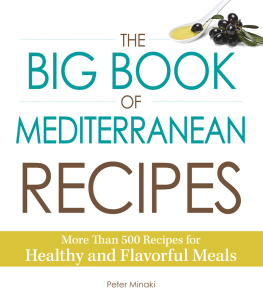
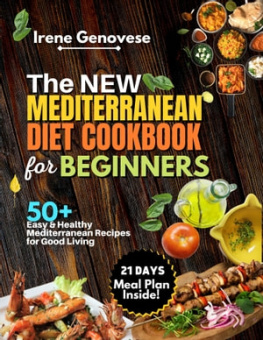
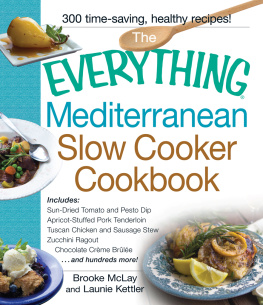
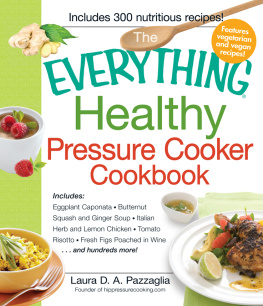
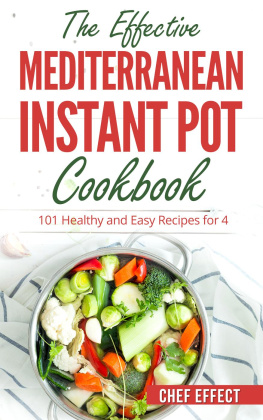
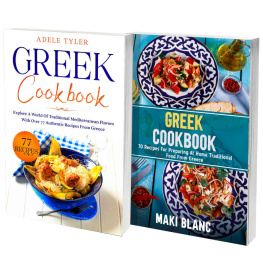
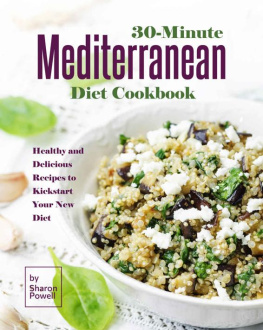
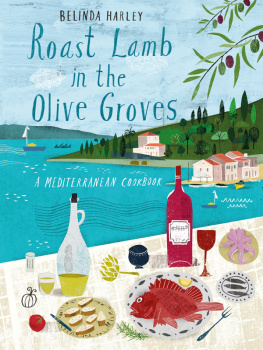
 Answers to common questions
Answers to common questions  Important snippets of information
Important snippets of information  Urgent warnings
Urgent warnings  Quick handy tips Visit the entire Everything series at www.everything.com
Quick handy tips Visit the entire Everything series at www.everything.com Avon, Massachusetts Dedication This book is dedicated to the mothers and grandmothers who fed us and nurtured us with food memories that inspire the cook in each one of us. A special thank you to my mother, Chrissanthi. Copyright 2015 by F+W Media, Inc. All rights reserved. This book, or parts thereof, may not be reproduced in any form without permission from the publisher; exceptions are made for brief excerpts used in published reviews.
Avon, Massachusetts Dedication This book is dedicated to the mothers and grandmothers who fed us and nurtured us with food memories that inspire the cook in each one of us. A special thank you to my mother, Chrissanthi. Copyright 2015 by F+W Media, Inc. All rights reserved. This book, or parts thereof, may not be reproduced in any form without permission from the publisher; exceptions are made for brief excerpts used in published reviews.